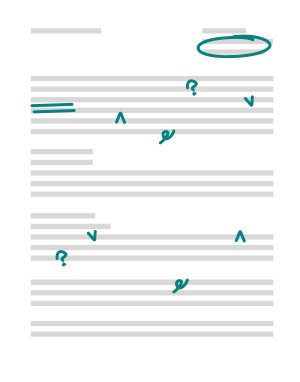Real Estate Investor Sample
Download and customize our resume template to land more interviews. Review our writing tips to learn everything you need to know for putting together the perfect resume.
A Real Estate Investor invests in properties for profit. Below is a general job description:
Real Estate Investors purchase, maintain, and sell real estate in order to acquire profit. Well-written resume samples for this job showcase duties such as researching properties, analyzing aspects like demographics and taxes, identifying properties that don’t bring profit, and negotiating real estate transactions. A successful Real Estate Investors should demonstrate industry familiarity, knowledge of legal regulations, business acumen, networking skills, strong communication and interpersonal abilities, and office management experience. Most resumes in the field display studies in finance, business, or real estate. JobHero
If this is the kind of job you want or you have, you're in the right place! We have a resume example for you and three tips from our professional resume writers below.
Expert Tip
You should never use a creative resume
Many job seekers think that an eye-catching resume template will help them stand out to hiring managers and increase their chances of landing an interview. This is a myth put out by resume builders that value design over content.
The truth is that most hiring managers prefer a traditional resume format.
Creative resume templates, like the one pictured here, can actually hurt your chances of landing an interview. Instead, you should use a basic resume format that quickly communicates your basic information and qualifications–like the one included below.
Real Estate Investor resume (text format)
How confident are you feeling about your resume? If you need more help, you can always refer to the following resume sample for a position.
Name
Title
City, State or Country if international
Phone | Email
LinkedIn URL
REAL ESTATE INVESTOR PROFESSIONAL
Growth-focused Real Estate Investor with expertise in investment principles and strategies. Well-organized with a track record that demonstrates self-motivation, perseverance, and the creativity to exceed goals. Well-versed in property inspections, contracts, market conditions, offers, and negotiation. An engaging communicator who builds lasting and productive relationships with others to facilitate long-term loyalty and growth. Exceptional interpersonal and team leadership skills, able to collaborate effectively and professionally with individuals from diverse backgrounds.
CORE COMPETENCIES
Real Estate
Market Prices
Market Conditions
Property Comparison
Relationship Building
Property investigation
Cold Calling
Contract Management
Escrow Activities
PROFESSIONAL EXPERIENCE
Real Estate Investor
ZipJob, New York NY | Year to Year
Responsibilities
Present purchase offers to sellers for consideration.
Negotiate prices or other sales terms.
Act as an intermediary in negotiations between buyers and sellers, generally representing one or the other
Compare a property with similar properties that have recently sold to determine its competitive market price.
Advise clients on market conditions, prices, mortgages, legal requirements and related matters.
Promote sales of properties through advertisements, open houses, and participation in multiple listing services.
Develop content for sales presentations or other materials.
Accompany buyers during visits to and inspections of property, advising them on the suitability and value of the homes they are visiting.
Prepare documents such as representation contracts, purchase agreements, closing statements, deeds and leases.
Confer with escrow companies, lenders, home inspectors, and pest control operators to ensure that terms and conditions of purchase agreements are met before closing dates.
Coordinate property closings, overseeing signing of documents and disbursement of funds.
Solely responsible for self-generating business through outside sales, cold calling, referrals and networking.
Worked in a team and helped motivate each member to build a business through referrals and hard work.
EDUCATION
Complete School Name, City, St/Country: List Graduation Years If Within the Last Ten Years
Complete Degree Name (Candidate) – Major (GPA: List if over 3.3)
Relevant Coursework: List coursework taken (even include those you are planning on taking)
Awards/Honors: List any awards, honors or big achievements
Clubs/Activities: List clubs and activities in which you participated
Relevant Projects: List 2-3 projects you have worked on
Everything you need to write your real estate investor resume
Now that you’ve seen an example of a job winning Real Estate Investor resume, here are some tips to help you write your own. You should always begin with a summary section. Remember to use basic formatting with clear section headings and a traditional layout. Finally, be sure to include top skills throughout your resume. We’ve included several examples common for Real Estate Investor below.
Let’s start with your resume summary section.
1. Summary
The resume summary replaces the out-of-date resume objective. A summary outlines the most impressive parts of your resume for easy recall by your potential employer, while also serving to fill in personal qualities that may not appear elsewhere on the page. Remember that summaries are short and consist of pithy sentence fragments! You can check out the Real Estate Investor resume example for more information!
Expert Tip
Always start with your most recent positions at the top of your resume. This is called reverse-chronological format, and keeps your most relevant information easy for hiring managers to review.
2. Formatting
Our experts recommend you start your resume with a resume summary, like the one above. Other common sections are Work Experience, Education, and either Skills or Core Competencies. Here are some guides from our blog to help you write these sections:
Some resumes will include other sections, such as Volunteer Experience or Technical Skills. When it comes to what sections you need to include on your resume, you will know best!
Other sections for you to consider including are foreign language skills, awards and honors, certifications, and speaking engagements. These could all be relevant sections for your resume.
3. Appropriate skills
Your resume should include all your skills that are relevant to your target job. Skills include both hard skills and soft skills. Hard skills are the technical know-how you need to complete a job, such as data analysis or HTML. You can include hard skills in your core competencies section. Soft skills are harder to quantify, so they require more information to explain your aptitude. Some top soft skill examples include communication, problem solving, and emotional intelligence. Use several examples of how you use your key soft skills throughout your work history, profile summary, and resume title.
4. Experience section
Your Work Experience section should make up the bulk of your resume. This section should include your relevant job titles, companies that employed you, and the dates you were employed.
Your Work Experience section should make up the bulk of your resume. This section should include your relevant job titles, companies that employed you, and the dates you were employed. Most people will finish this section by listing daily duties in short bullet points. Don't be one of them! To make your resume stand out, you need to add your accomplishments and key skills to your resume's Work Experience section. Here are three tips from our experts:
Use the STAR method to describe a situation, task, action, and result. This is adapted from a behavioral interview technique, so interviewers will recognize the format. it's also a great chance for you to organize your key accomplishments.
Don't forget about LinkedIn! The majority of employers are going to look you up on LinkedIn, so it's smart to make sure your LInkedIn profile is up to date and include your URL in your resume's contact section.
Always include a cover letter. Not everyone will bother, so it helps you look like a serious job applicant. It's also your chance to introduce yourself: who you are, why you're applying for this job, and how you want to proceed.
Let’s wrap it up!
Standout resumes will include a resume summary, a traditional reverse-chronological layout, and the skills and experience relevant to your job target. This resume example shows how to include those elements on a page. It’s up to you to insert your personal compelling qualifications.
Keep your resume format easy to scan by both humans and computers; our resume template is designed by our experts to satisfy both audiences. And be sure to include your own skills, achievements, and experiences. Job-winning resumes are resumes that successfully market you, leading recruiters and hiring managers to want to learn more!
Finally, emphasize your interest with a customized cover letter. When writing, remember that the resume and cover letter should support each other. Check out our cover letter tips and examples for more advice.
Didn’t get the specific answers you were looking for on this page? Hire a professional resume writer to get the advice you need to land your next job.
Related posts:




